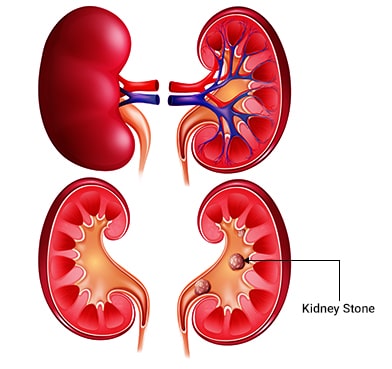Kidney stones are a painful health issue that impacts millions of individuals worldwide. A recent report suggested that the occurrence of kidney stones is rapidly increasing, with an estimated 10% of the population suffering from this condition. Although this condition affects people of all ages, genders, and ethnicities, men are more likely than women to experience it between the ages of 20 and 49. Kidney stones may cause mild to severe symptoms, and if left untreated, they can have serious side effects. Fortunately, with the help of kidney stone surgery in Delhi or nearby areas, you can get rid of kidney stones and stay on top of your urology health.
This comprehensive guide will examine the symptoms, causes, and treatment options for kidney stones. It aims to educate readers with a deep understanding of kidney stones and their effective treatments and to provide them with all the information required to make wise choices.
What are Kidney Stones?
The kidneys are responsible for removing waste from our blood to make urine. When there is a lot of waste in the blood, and the body does not produce much urine, crystals begin to occur in the kidneys. These crystals attract other waste and chemicals to form a kidney stone that gets larger unless it is passed out of the body while peeing. When these stones pass through the urinary tract, they can cause severe discomfort and suffering. They can range in size from a little grain of sand to a golf ball.
What are the Symptoms of Kidney Stones?
The symptoms of kidney stones vary depending on the size and location of the kidney stones. If you had a small kidney stone, it might have passed out of your body through urine. You might have never felt the symptoms and never knew you had a kidney stone. However, if it is a larger stone, it might get stuck in the urinary tract and block urine from passing through. Following are some of the common symptoms of kidney stones:
- Pain while peeing
- Blood in the urine
- Severe pain in the abdomen that does not go away
- Sharp pain in the back
- Fever
- Nausea
Note: If you are experiencing any of these symptoms, you can seek the help of Dr. Niren Rao, the best urologist in Delhi and founder of Delhi Urology Hospital. Let us now discuss what causes kidney stones.
What are the Causes of Kidney Stones?
Any individual can get a kidney stone, but some individuals are more likely to get one. As discussed above, men are more likely to get kidney stones than women. You are more likely to experience a kidney stone if you:
- Do not drink enough water
- Eat a lot of protein or sugar
- Are overweight
- Are suffering from polycystic kidney disease
- Have someone in your family experiencing kidney stones
- Have had a health issue that causes your urine to contain more cystine, oxalate, uric acid, or calcium
- Are taking medicines such as diuretics (water pills) or calcium-based antacids
How is Kidney Stone Treated?
The treatment for kidney stones is the same in children and adults. The urologist may recommend that you increase your water intake and will suggest medications. Expert urologists such as Dr. Niren Rao try ways and methods that can make the stone pass without surgery. However, if the stone is too large or if it blocks the flow of urine, it is removed via surgery. The following are the two options for treating kidney stones with the help of surgery:
1. Percutaneous Nephrolithotomy (PCNL)
This procedure is used to treat large kidney stones larger than 2 cm. The urologist makes a small incision in the back, and a nephroscope is used to fragment the stones into smaller pieces using lasers. With this surgery, the patient experiences minimal bleeding and less postoperative pain.
2. Retrograde Intrarenal Surgery (RIRS)
Patients with smaller stones (15-20mm) or very small stones in both kidneys can undergo retrograde intrarenal surgery. The surgery is performed with a flexible ureteroscope, which is inserted from the urine passage, then into the ureter, and directly into the kidneys. Once inside the kidney, the stone is fragmented with lasers.
How Much Does Kidney Stone Surgery Cost?
At renowned facilities like Delhi Urology Hospital, kidney stone surgery costs an average of Rs. 35,000 and Rs. 60,000. PCNL costs between Rs. 35,000 and Rs. 40,000, and RIRS surgery starts at Rs. 60,000. The cost varies from person to person depending on factors such as the size of the stone and the procedure performed.
Final Takeaway
Kidney stones can be extremely painful and difficult to manage. However, with proper treatment, they can be handled very well. If you experience any symptoms of kidney stones, you can seek help from Dr. Niren Rao, a notable urologist at Delhi Urology Hospital, the best urology hospital in Delhi, to get an appropriate diagnosis and treatment.
The expert urologist specializes in providing an effective kidney stone treatment at an affordable price. Visit Delhi Urology Hospital today for more details!

Comments
Post a Comment